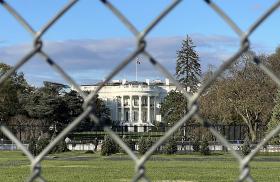
- Policy Analysis
- Articles & Op-Eds
Israel Sends Hezbollah Twin Messages
Also published in Boston Globe

Israel’s cloak-and-dagger pager ploy was extraordinary, but will it change the group’s calculus?
Earlier this year, when Hezbollah, the Iran-backed militant group based in Lebanon, decided to ditch cellphones in favor of pagers and handheld radios, it was trying to deny Israel the ability to hack and track its operatives. Instead of improving the group’s operational security, however, that move opened the door for an Israeli intelligence coup. By detonating those pagers and walkie-talkies last week, Israel severely disrupted the group’s operational capabilities at least in the short term.
But what Israel really wants is for Hezbollah to stop shelling northern Israel so thousands of displaced Israeli civilians can return to their homes. It’s not clear Hezbollah will get that message.
This all started in February, when Hezbollah leader Hassan Nasrallah warned his fighters that Israeli intelligence was tracking their movements via their cellphones. “Israel no longer needs collaborators,” he warned. “Its surveillance devices are in your pockets. If you are looking for the Israeli agent, look at the phone in your hands and those of your wives and children.” Hezbollah then embarked on what it called a “blinding” strategy of using low-tech tools to evade Israel’s vaunted intelligence capabilities.
But Israel, in an extraordinary cloak-and-dagger deception, outfoxed Hezbollah by setting up a front company that produced the lethally armed low-tech communication devices Hezbollah acquired for its members. The pagers and walkie-talkies that exploded last week killed at least 37 people and injured some 3,000 more, the vast majority of whom were Hezbollah militants, including commanders of the elite Radwan special forces unit. Members of other militant groups were hit as well, including some 40 Yemeni Houthi militants in Lebanon and Shia militants in Syria and Iraq. Also wounded was the Iranian ambassador to Lebanon, whose responsibilities apparently required him to wear a Hezbollah operations pager.
Hezbollah now faces not just a blow to morale and loss of critical personnel but also a loss of confidence in its operational security. As a result, the group is less capable of fighting a full-scale war with Israel. It can and will recover as the wounded heal, new fighters are trained, and communications systems are rebuilt. But today Hezbollah is in a bind: It wants to respond to the Israeli operation, but it stands unprepared to withstand the Israeli response to a serious escalation, such as having the ability to fire longer-range rockets with larger payloads deeper into Israel.
But though it was a tactical success, the Israeli operations did not go exactly as planned, and its strategic benefits remain inconclusive. The operation targeted Hezbollah wartime communication systems and was intended to be used only in the context of a full-scale war, to cripple Hezbollah if such a conflict broke out. Concerned Hezbollah may have uncovered the secret operation, Israeli officials faced a use-it-or-lose-it moment and so decided to detonate the devices over two days to maximize anxiety within Hezbollah.
The Israeli decision to go forward rested on the premise that beyond its tactical advantages, the operation would also signal to Hezbollah that the group would suffer increasingly dangerous consequences should it fail to stop its months-long campaign of rocket attacks. The day of the pager blasts, the Israeli security cabinet officially expanded the country’s war goals to include returning the more than 60,000 displaced Israeli civilians to their homes in abandoned communities along Israel’s northern border.
These warnings have teeth, coming as they do as the latest in a series of daring and successful Israeli intelligence actions. In July, Israel assassinated both Hezbollah’s top military official in Beirut and the leader of Hamas in a Revolutionary Guard guest house in Tehran. Last month, Israeli intelligence launched a preemptive attack destroying Hezbollah rocket-launching sites hours before the group planned to attack Tel Aviv. Two weeks ago, Israeli special forces raided an Iranian facility in Syria, destroying an underground factory producing missiles for Hezbollah. Last week, Israel launched an intensive series of warplane strikes against missile-launching sites in Lebanon. And just days after Hezbollah’s communications devices exploded, an Israeli airstrike reportedly killed Ibrahim Aqil, the head of Hezbollah’s military operations, along with much of the senior command of Hezbollah’s Radwan special forces.
With those moves, Israel has communicated two messages to Hezbollah. The first: “We can find and kill your most senior leader. We know about your intention to carry out attacks before you launch them. And we can blow up the pager on your belt and the radio in your hand.” That message came through loud and clear.
What’s less clear is whether Hezbollah heard the broader strategic message as well. “The goal was to convince Hezbollah that it is in its interest to disconnect itself from Hamas and cut a separate deal for ending the fighting with Israel regardless of a ceasefire in Gaza,” a person familiar with the Israeli operation told Axios. So far, however, Hezbollah has insisted it will continue launching rockets at Israel until there is a ceasefire in Gaza.
Perhaps as a result, Hamas does not appear eager to agree to a ceasefire (nor, for that matter, does Prime Minister Benjamin Netanyahu of Israel). Hamas leader Yahya Sinwar recently announced Hamas is prepared for “a long battle of attrition.” But whether as part of a Gaza ceasefire deal or not, Israeli officials are deadly serious about their commitment to enabling displaced Israeli citizens to return to their homes along the northern border. These latest strikes are aimed at diminishing both Hezbollah’s capacity to fight an all-out war and its ability to continue firing rockets into northern Israel.
Speaking the day before Hezbollah’s pagers blew up, Israeli defense minister Yoav Gallant told US Secretary of Defense Lloyd Austin that time is running out for a diplomatic solution to the standoff with Hezbollah. Two days later, Gallant announced that the attack on Hezbollah’s communications opened “a new phase” in the conflict with Iranian proxies, with the Israeli military’s focus shifting from Hamas in Gaza to Hezbollah in Lebanon. In the words of the Israeli army chief of staff: “The price for Hezbollah has to be high.” Hezbollah’s communications are temporarily down, but maybe they’ll still get the message.
Matthew Levitt is the Fromer-Wexler Senior Fellow at The Washington Institute and director of its Reinhard Program on Counterterrorism and Intelligence. His previous projects include the interactive Hezbollah Worldwide Activities Map and the just-updated book Hezbollah: The Global Footprint of Lebanon’s Party of God. This article was originally published by the Boston Globe.



